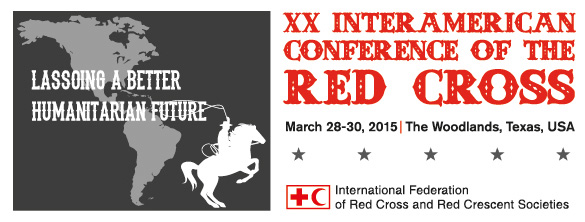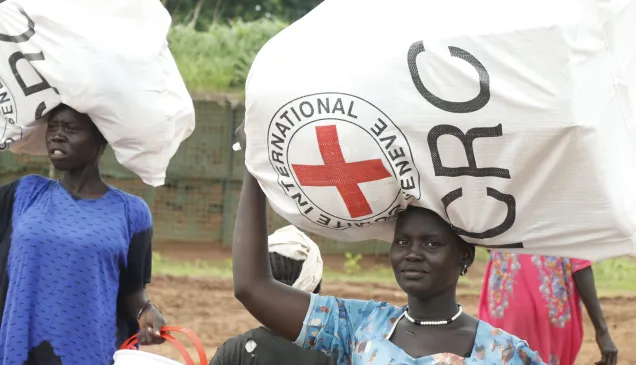Health care in danger: Latest news
The impact of violence on health-care workers was a central topic at the 20th Inter-American Conference of the Red Cross in Houston, Texas, in the United States. Similarly, other events and workshops took place from January to June 2015.
***
The French Medical Council (CNOM) hosted a meeting in Paris in January. The meeting broke new ground in tackling the issue of HCiD in France, a country that is at peace. Doctors, nurses, midwives, pharmacists, and representatives of the French health ministry and the French Red Cross reviewed incidents of violence against health-care workers in France, and concluded that proper coordination and adequate training for health professionals were indispensable.
***
Two Health Care in Detention seminars took place in Amman, Jordan. The first, in February, was attended by medical and security staff working in places of detention, and by representatives of the General Intelligence Department of Jordan. The second, in March, was attended by officials from the World Medical Association (WMA), and by representatives of medical associations from nine Middle Eastern and North African countries. Participants discussed the links between HCiD and health in detention, methods – for health staff in places of detention – of coping with stress, medical ethics and dilemmas. The meetings were great opportunities for participants to share experiences and to network.
***
In February, the Norwegian Red Cross organized, in Oslo, a seminar titled Armed Non-State Actors and Access to Health in Armed Conflict. Invitees included various Norwegian government ministries, members of the Norwegian armed forces, humanitarian organizations and research institutions. Participants explored the rights and responsibilities of armed groups and how various organizations and the Norwegian government could influence international policymakers on the issue of access to health care, in connection with armed groups. The main conclusion was that looking at armed groups as patients and health-care providers, and not only as perpetrators of violence against health-care personnel and facilities, was an important starting point for building a dialogue with them.
***
The International Federation of Medical Students' Associations (IFMSA) had its General Assembly in Antalya, Turkey, in March. The IFMSA is the largest international student organization and a key partner for the HCiD project. Participants to the HCiD session, who represent future generations of doctors, discussed the dangers they may encounter in the future.
***
In early April, a historic meeting for the HCiD project took place in Geneva between representatives of the HCiD Movement Reference Group (MRG) and international health-care organizations. The MRG is made up of the International Federation and 27 National Societies; its function is to provide guidance on the HCiD project. The following health-care organizations were represented at the meeting: the WMA, the World Health Organization, the International Hospital Federation, the International Pharmaceutical Federation (FIP), the World Confederation for Physical Therapy, the IFMSA, the Safeguarding Health Coalition, the World Federation for Medical Education and the International Committee of Military Medicine (ICMM). Participants discussed how to put ethical principles into practice and how to build on action at the local and regional levels – with States and local health-care organizations, for instance. This meeting, the first of its kind, drew attention to the ways in which HCiD could bring people and institutions together, and generate ideas for improving the situation on the ground.
***
In April, the WMA had its 200th Council Session in Oslo, Norway. The WMA Working Group on HCiD met to discuss how to implement HCiD recommendations at the national level. In addition, the British Medical Association presented its manual on ethical dilemmas, which will be of great help to health-care personnel in the field.
***
The 41st World Congress of the ICMM took place in May in Bali, Indonesia. The meeting was of particular significance for the HCiD project, as the ICMM formally endorsed a document titled Ethical Principles of Health Care in Times of Armed Conflict and Other Emergencies. The ICMM's endorsement means that the organization will be responsible for disseminating, among its 112 member States, the principles set out in the document.
***
In May, the Junior Doctors Network and the IFMSA hosted an event on the margins of the World Health Assembly in Geneva, Switzerland: it was titled The Role of Education and the Methods of Training that Set the Values and Competencies of Students and Junior Doctors. Participants discussed how to ensure that medical students and junior doctors know about their responsibilities and how to incorporate new tools – such as the HCiD e-learning module for health-care workers – in existing curricula.

The impact of violence on health-care workers was discussed in March, during the 20th Inter-American Conference of the Red Cross in Houston, Texas, in the United States.
An HCiD workshop was hosted jointly by the American Red Cross and the Colombian Red Cross, and chaired by the Salvadorean Red Cross. Over 70 participants from the International Federation of Red Cross and Red Crescent Societies, 25 National Societies and the ICRC heard first-hand accounts of the humanitarian impact of violence in the Americas, of the challenges facing health-care workers, who often risk their lives to help those most in need, and of measures that National Societies in the Americas are taking to protect them. Participants stressed the need for more action on this issue.
The president of the Salvadorean Red Cross said, "As a Movement, we must find ways to address these threats in order to protect the lives of the volunteers and health workers helping communities."



